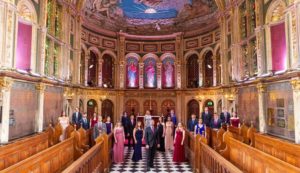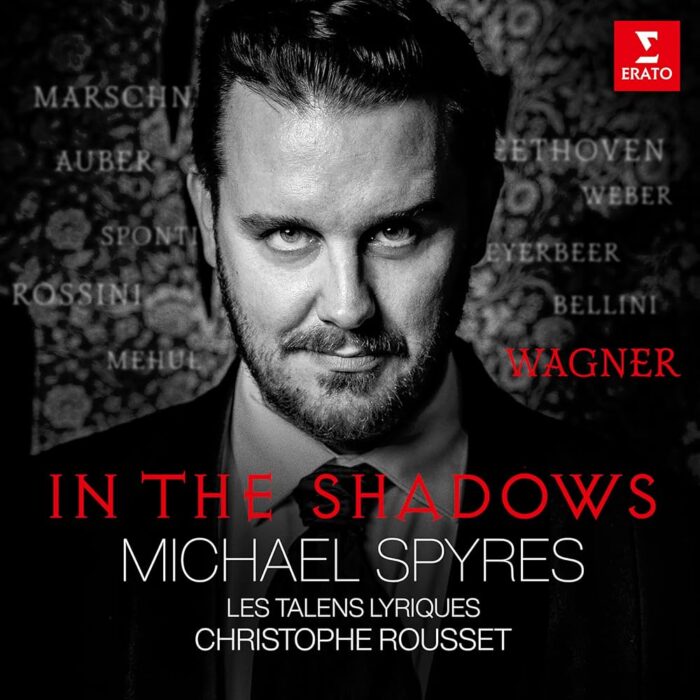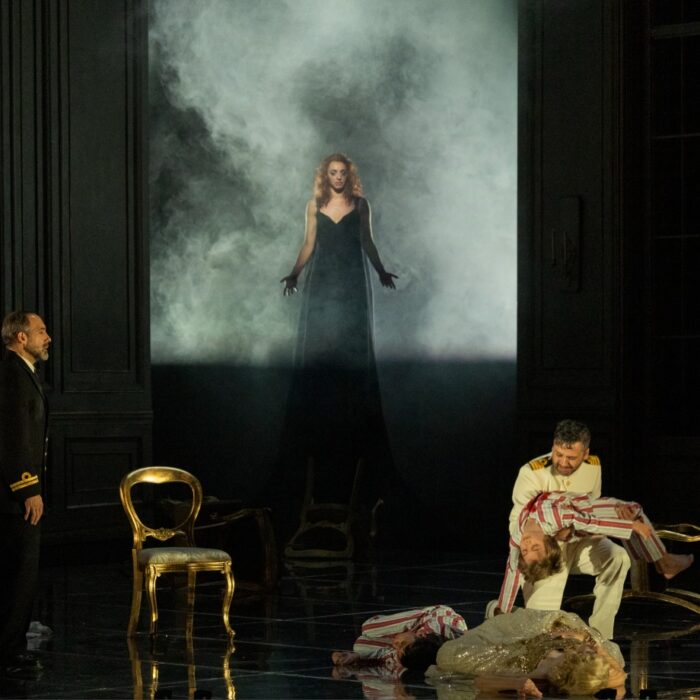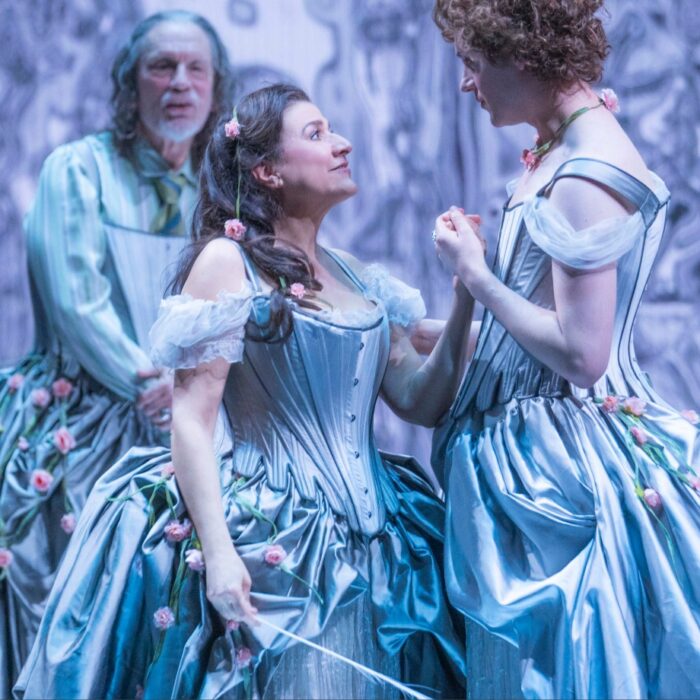
St. George’s Bristol 2021-22 Review: Messiah
Alex Ashworth, Gavan Ring, Felicity Buckland, Keri Fuge Deliver Heaven on Earth
By John VandevertHoping to reinvigorate waning public interest in Italian opera’s extravagance and pretentious filigree, Händel was of no mind to delay conceiving a new orientation for his musical talents. Thus, despite staying firmly committed to his Italian proclivity, he began creating English oratorios on the side to supplement lost income, and after a series of tries with both English and Italian, in 1741, he reluctantly caved and bequeathed himself to the English craze and abandoned Italian opera.
This turned out to be well in his favor, and despite challenges and tribulations along the compositional path—a relatively cold reception in London following a glowing one in Dublin, near-constant reorchestration, needless quarrels over historical authenticity, and egregious stagings, Handel’s “new Sacred Oratorio” became the business card of God himself, and one of the most recognizable (and needed) allegories for peace, forgiveness, and confraternity.
Setting the Stage
On April 2nd, St. George’s Bristol, whose home is a repurposed 201-year-old Anglican church constructed in the Greek Revival tradition (a detail that’ll become important soon), The City of Bristol Choir, conducted by composer and conductor David Ogden, performed Georg Friedrich Händel’s glorious “Messiah.” The work is a staple in modern oratorio literature and is one of the most well-known in the choral public consciousness. It can count among its kin Beethoven’s Symphony N0. 9, Orff’s “Carmina Burana,” Mozart’s “Requiem,” Haydn’s “The Creation,” and, more contemporaneously, Stravinsky’s “Symphony of Psalms,” and Britten’s harrowing “War Requiem.”
The hall was packed full, and as the overture played, it seemed people, young and old, had flocked there. Yet another allegory, I should say, on top of the pronounced feeling of solidarity with Ukraine, which seems never too far from reach. I cannot say if God smiled, but I can say that the audience was beaming.
Much praise must be given to Ogden from the start, as his firm hand and decisiveness on nearly every happening—musical, dramaturgical, and otherwise—was impressive and representative of someone who truly deserves the title of “The people’s conductor.” Regardless of their small size, the Bristol Ensemble, led by violinist Roger Huckle, possessed a unity of intentionality throughout the evening that was beyond compare. Their impressive track record speaks volumes about what the audience and I experienced.
Serving as the evening’s sacred orators, Keri Fuge (soprano), Felicity Buckland (mezzo-soprano), Gavan Ring (tenor), and Alex Ashworth (bass) not only sang but effortlessly exuded a spiritual glamor that no layperson can describe, most certainly not myself.
Impeccable Text Led to Lightning-Quick Composition
By combining passages from the King James Bible and the Coverdale Psalter, librettist Charles Jennens’ text presents a masterfully elegant and devotionally unambiguous triptych on the birth, life, and death of Christ. While Jennen’s relationship with Handel was strong before “Messiah,” the libretto was apparently so immaculate that Handel felt no need to edit it before beginning his musical work, which was ready for the printer just two months later.
Whether one believes this to be true, much like Hildegard von Bingen, Charles Francois Gounod, and Alexander Scriabin, Handel’s rapid compositional production could have been heaven-sent, an inscription at the end of the score reading “SDG,” alluding to the phrase “Soli Deo Gloria” (Glory to God alone). This three-word phrase has been connected to others like Bach, who wrote S.D. G on the bottom of nearly every one of his sacred works, and Christopher Graupner, a contemporary of Bach and Handel, denotes that all good things and praise originates from God alone.
As noted by many, the marriage of text with music is sublimely done, and what could be called “proto-programmatism” is clearly evident in nearly every part of “Messiah.” Consider as examples the tenor’s joyful aria “Ev’ry valley,” where hills and plains are given vocal body; the ebullient chorus, “For unto us a child is born;” the mezzo-soprano’s aria “He was despised,” a somber and plaintive invocation of Christ’s treatment; the bass’ formidable aria “Why do the nations so furiously rage together,” and but one of the soprano’s many evocative arias, “I know that my redeemer liveth.”
Heaven on Earth
But why is “Messiah” so important now, almost 290 years after its first premiere in Dublin? Because not only does it prove a vital resume builder for any soloist, chorister, and musician lucky enough to participate in one of its performances, but the music itself is such that with no prior knowledge of music or musical training, one gets an immediate feeling that they understand the work. And not simply a musical understanding but a deep feeling of mental and emotional clarity that only a piece of genuinely heartfelt and selfless music can produce.
While the world is full of automatic responses and mindless drudgery, Handel’s music draws us closer to the core of our being; his euphoric scoring of terrestrial and extraterrestrial experiences opens the heavens to a world in which we all, whether or not consciously, desire to be accepted into. As a musicology student, experiencing a live performance of Handel’s “Messiah” is a resplendent and required reminder to look past the theory, data, historiographical subterfuge, and the nexus of what makes music truly special.
What I can say about perfection? Each of the four singers was utterly sensational in their own way, and when partnered with the City of Bristol chorus, whose intonational acumen was of the highest order, and the Bristol Ensemble, sublime as to be expected, captured the breath of nearly every person at St. George’s that night, myself included. At times, I held my breath in hesitation of disrupting the beguiling mysterium that had built up in the hall after each number in what was a long but transfixing night of prayer and devotion—one of such a magnitude that I truly and humbly thank every performer for having created.
From the beginning, the French-styled pastoral “Sinfony” set in the key of E minor was played with sensitivity, befit no thing mortal, and conducted by Ogden with a gracious meticulousness that only a composer and altruist could have produced. Tenor Gavan Ring mesmerized me as he made his way forward in a confident air. The performance was incredible; each aria, chorus, and orchestral numbers were of impeccable quality and stylistic sensitivity. The artists expertly handled nearly every treacherous area that can cause quite a few performances to derail themselves. Specifically, overall tempic speeds; the Part one choruses “And the glory of the Lord” and “And he shall purify;” Part two choruses “Let all the angels of God worship Him” and “Let us break their bonds asunder;” and the bipolar nature of the Part three chorus “Since by man came death.” For the soloists, these come along with the perennial contention of “Should I embellish?” and “How much?”
Despite such problemata, the performance was exceptional and echoed in authentic stature to Beecham’s 1928 recording—the first to capture the work’s original brilliance, using intimate forces and agile tempi as its touchstone. Much like the history of the work and its many historical and contemporary iterations, the soloists were especially apt in their ability to dance the fine line between contemporary operaticism and oratorio modesty. Having trained as a tenor myself and gone through the ‘fun’ negotiations of learning “Messiah,” each of the singers was aware of the stylistic constraints of the repertoire yet transcended expectations for what they accomplished within them. By the “Amen fugue” in the final chorus, it was clear that Handel’s style had permeated deep into the singers.
Sublime Performances
English soprano Keri Fuge commanded the evening with a brilliance only a singer well-versed in the repertoires of early music could produce. It’s evident that she knows every inch of her voice and, more importantly, how to apply her talents. Fuge’s grace, compassion, technical precision, agility, flexibility, dramaturgy, and effortless purity needed to be a true Handelian soprano are a few core components of her expertly crafted instrument. Much like the Greek revivalist architecture by which Handel’s glorious oratorio found its home the night I attended, Fuge perfectly integrated the fragrant aroma of baroque filigree and coloratura-drenched Italianism with the pious and stout choral traditionality of the Germans by which Handel was intimately understood. Her first aria, “Rejoice Greatly,” was a master class in oratorio technique, and because of Fuge’s experience in early music and classical repertoire, a cogent balance between dramaturgy and order was maintained. Her entire range, well-balanced yet so indulgent, was on display throughout the night, “How beautiful are the feet” demonstrated Fuge’s ability for legato perfection. She imbued “I know that my redeemer liveth” with such beauty, grace, and elegance and delivered, in my opinion, the best aria of the night, “If God be for us.” Clean, evocative, and rich, Fuge set a new precedent for what it really means to be a 21st-century oratorio singer.
Mezzo-soprano Felicity Buckland gave an effusive show and augmented the audience’s mind through warm tones and a lush, lyrical brilliance only someone with an intimate understanding of Wagnerian repertoire could create, and her first aria, “But who may abide,” was a great introduction to her comely voice. Buckland gave a performance of dynamic complexion using a panoply of artistic effects. The mezzo-soprano is one of the most undervalued figures in “Messiah,” given five (official) numbers, with another five as optional. Luckily, Buckland was given several of those “or arias,” as I like to call them humorously. This was much to the benefit of the entire performance, as her diverse colors, expert usage of inflectional devices, and ability to navigate the waters of depth and innocence with a penchant for drama were a great pairing alongside her lighter colleagues. A look into her biography shows her experience with not just Wagnerian literature but contemporary repertoire such as Glass’ “Satyagraha,” Britten’s “Peter Grimes,” and Gershwin’s “Porgy and Bess,” making Buckland’s methodical yet wholly natural approach towards musical dramaturgy impeccable.
I was slightly concerned at the beginning. Buckland’s voice sounded a bit swallowed and manufactured, while at other times, she fell behind the small orchestra, a worry given her Wagnerian experience. By “Behold a virgin shall conceive,” I was convinced of her masterful technique. Supported by an unflappable knack for breath control, every inch of her range—most notably her chest voice—radiated a deep tone, although I wish she would have brought it forward, as richness without overtones does no one good. “Then shall the eyes” showed off Buckland’s wholesome and stately timbre marvelously, while the arias “He was despised!” and “Thou art gone up on high” were incredible in their dynamic clarity.
In youthful vigor and lyrical resourcefulness, the dramatically tinged leggiero tenor Gavan Ring treated the “Messiah” with operatic grandeur while maintaining all the necessary regulation that oratorio singing requires. Finding freedom through an appeal to bel canto excellence, Ring communicated the sublime beatitudes of Handel’s divinely inspired vocal symphony through effulgent musicality that captured the beauty of the natural tenorial voice. Using expressionary inflections and articulatory spice to decorate a strong lyrical base, Ring sang strongly throughout the night, although at times, his operatic exuberance got the better of him, and what should have been intimate moments were cast in a bravado light. Ring’s biography delineates his experience with quintessential bel canto repertoire like “Così fan tutte,” “La Traviata,” and “La Favorite,” while Ravel’s “L’enfant et les sortilèges” explains his vocal cleanliness and suave usage of musical gestures.
Throughout the entire oratorio, Ring excelled. Starting with “Ev’ry Valley,” Ring’s dramatico-leggiero mixture boded well for him. Because this first aria is important in setting the tenor for the rest of the oratorio, there’s pressure on the vocalist to do it well. Ring met the challenge face first, and his legato fluidity, dynamic clarity, agility, and expressionary delivery were evident from the start. Despite his extended rest in Part one, Ring returned in Part two, embodying the sound and image of the ideal Handelian tenor. He was robbed of Part three as the alto/tenor a cappella duet “O death, where is thy sting?” was cut–improperly, I might add, even if tradition holds that this number is omitted. It’s a shame they scrapped this highly visceral moment, as it would’ve been a glorious sight to behold, a moment of unaccompanied polyphony before the entrance of the penultimate chorus. Regardless, “Thou shalt break them” and “Behold and see if there be any sorrow” were masterfully executed, to no one’s surprise. Ring’s experience as an opera-qua-recitalist pushed Handel to new heights.
Forming the grounded lynchpin to reality itself, bass Alex Ashworth gave an austere and laudable performance as the moralist undertone to Handel’s sacred work. As the third busiest member of the group, the bass, much to my dismay, is given little to nothing to work with in “Messiah.” Having only three official arias, with only a select few more “or arias,” of which the two most popular, “Thou art gone up on high” and “But who may abide,” were handed to the mezzo-soprano for some absurd reason, Ashworth was snubbed of any chance to show off effectively what his voice can do. With what little he had to work with, he excelled at providing a phenomenal grandness to the evening that no rambunctious baritone or pseudo-bass could replicate. Ashworth’s biography, and very much his mature voice, relays his experience with oratorio and cantata-based repertoire, having interpreted everything from Monteverdi, Telemann, and Bach, to Mendelssohn, George Dyson, and Buxtehude.
Ashworth’s vocal talent is not in question. However, I wonder whether his voice could benefit from a bit more light. In “Thus saith the Lord,” while majestic in overall feeling, the melismas got quite heavy and hard to decipher, although in the accompagnato “For behold” such a technique works perfectly because of its slower tempo. In Part two, the aria “Why do the nations so furiously rage together” was a sublime example of the quintessential agile bass, a popular anecdote being “anyone should be able to do coloratura” perfectly exhibited here. I blushed because of his sound’s paternal and wholly selfless radiance. His final aria, “The trumpet shall sound,” was a show-stopper and clearly showed his ability to be simultaneously direct yet gentle. Ashworth is a sturdy pontificator, with his mature voice bringing a lovely fatherly air to the oratorio.
City of Bristol Choir’s presentation of Handel’s “Messiah” was a marvel of contemporary oratorio performance, where historical authenticity was respected and built upon, neither attempting to remake the wheel nor use the same path as previous iterations. With the organized precision of the Bristol Ensemble, and the adept attentiveness of four highly trained soloists, all led by the competent beyond merit David Ogden, I am more than pleased with how the performance went and am well-advised to go to see them again. If the Greek Revival architecture’s presence is spotted anywhere, it’s the fact that not a single moment went to waste, not a single note, nor a single cut-off or catch-breath. It was truly a spectacular and riveting occasion.


